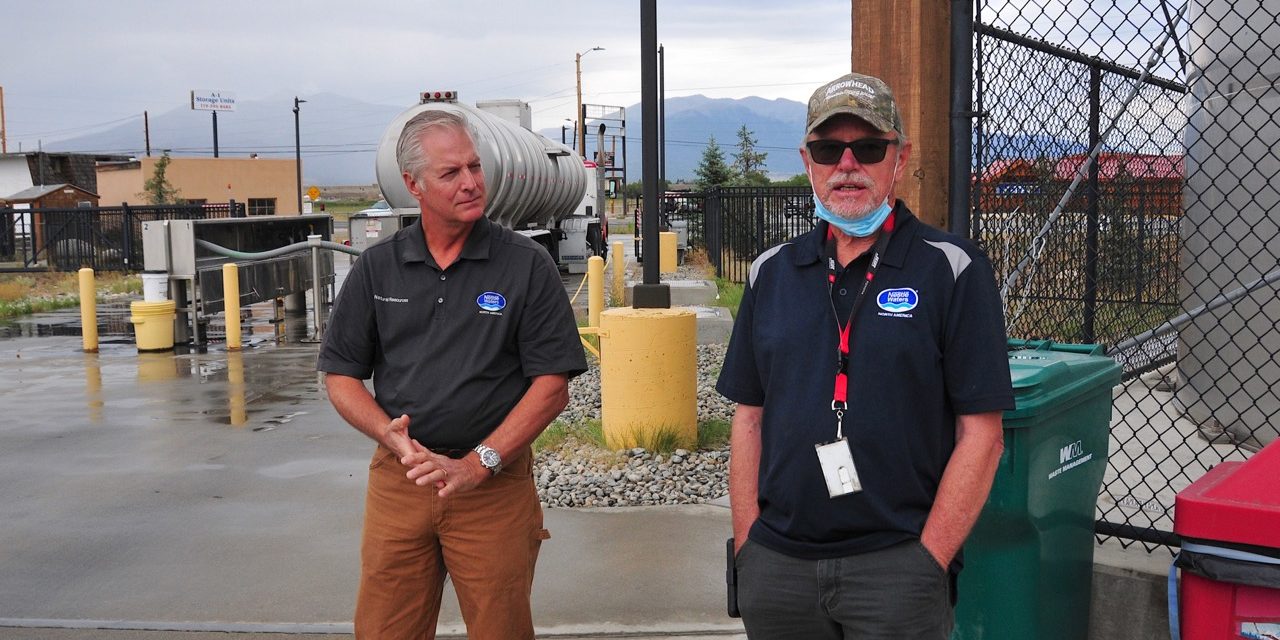There is no shortage of conflict over the Nestlé Waters North America (NWNA) 1041 permit review that continues to plod along before the Chaffee County Commissioners.
As if things weren’t complicated enough, this week’s public hearing regarding consideration of a 1041 permit renewal for NWNA appeared even murkier. The Chaffee Board of County Commissioners, acting as the 1041 permit review board, attempted to clarify the legal nature of the entity with which they are dealing.

Daniel Johansen, right, Load Station Manager for Nestle Waters North America, explains the hauling operations while a truck fills behind Larry Lawrence, Nestle Natural Resources Manager who hosted a tour of the local facilities in late August. Dan Smith photo.
For the time being, the county continues on a 1041 permit review path. The session is continued to 1:00 p.m. May 18. The session will allow BlueTriton, (the new name of the 1041 permittee) to comment on the Harvey Economic Report, to answer questions about the NWNA Annual Report, and for continued public comment.
In simplified terms, what’s at issue is this: was the “transfer” of 100 percent of the shares of NWNA to new ownership by OneRock Capitol and Metropolis simply a stock transfer — a view put forward by their attorney Caitlin Quander — or was it a sale?
If it was a sale, then is the current 1041 process even relevant? Or should the applicant just start over? How does that match with the fact that the current permit was extended to August 4 during an earlier public hearing on the topic, to allow time to absorb the results of an economic impact study, presented last week?
Finally, there is this — since the name of the permit requester changed in the middle of this process — how exactly does the name change to BlueTriton figure into the mix?
Commissioners attempted to get at the answer to these questions, raising reasonable comments such as “I thought it was more like Nestlé SA was selling an asset,” and “now I believe that this is a transfer”.
Quander replied, “It is treated as an asset, but it was a sale of shares for the ownership of the group. They are 100 owners of the holding company and the shares were sold, not the asset groups. It is not publicly traded. BlueTriton is the holding company and the BlueTriton brand is the permittee.”
Commissioners pointed out that both entities are incorporated as Delaware corporations and neither are publicly traded, meaning that it would become hard to track the profit being made off water coming from the county. This might also make it hard to track whether this new entity was meeting its commitments.
“I have enough concerns about this that I need to be convinced that this isn’t a transfer,” said Commissioner Keith Baker. “There are people depending upon it for their livelihood. If it is a transfer – and I think it is – it bears a higher level of scrutiny. It isn’t a simple transaction, just something handed over … I think we need to treat it as a new operation; it is different enough that we need to have these assurances.”
Commissioners generally agree that at this point they don’t want to return to where they were at in Sept. 2019, when the permit application was made, and that the county already has a large investment in the process.
“I’m in agreement with the Aug. 4 extension; we should honor that,” said Commissioner Rusty Granzella. “But as far as the change, BlueTriton is representing itself as agreeing to do what NWNA had already said they would.”
“I think we’re in agreement,” said Commissioner Greg Felt. “I don’t know where it is headed in terms of a final decision – if we go forward, we could address the issues that are embedded in the changes that have happened, rather than stop everything.”
There was public comment that the county should simply set aside the permit process so far, and start over again with a new 1041 permit application. The county’s own legal department said it would prefer to view the existing application as a new permit application, rather than an extension. Felt reminded the audience that, “it is perfectly commonplace for a permitting authority to extend the permit,” particularly since the county, like the rest of the country, has been in a state of emergency since the COVID-19 pandemic hit.”
“When you granted that extension it was for the purpose of allowing the development of the application, and more time for the public to analyze the request,” said County Attorney Jenny Davis. ” The county had the authority to temporarily extend an existing permit – given what you knew at the time, and the situation at the time. You are treating it the same as a brand new application – all the standards, extensive hearings, extensive public comment, development of an expert analysis, and economic impact study.”
Public comment revealed what has become the expected comments; regarding threats to the environment, the county’s and central Colorado’s water shortages, and new worries about the impacts of private equity buyers meeting obligations in a transparent manner.
“The idea of a private equity company coming in and cutting expenses, and getting better quarterly profits, and packaging it to sell is real,” said Francie Bomer. She added that there are unanswered questions about this new entity “… Private equity firms are not known for their attention to people, land, or water. We need a brand new permit [process].”
“It’s the benefit to the county going forward – everything that is in that permit today goes backward,” she added. “Why would we want to transfer that to a private equity firm and expect to get something for the county? Deny it and suggest the applicant start over as BlueTriton.”
“I don’t understand why a sale of 100 percent of a company’s share is not a sale of the company,” said Lizzie Bower.
County resident John McGowan, who framed his remarks as coming with the benefit of his years in the investment community raised the issues of the leveraged nature of the purchase. He added that even Moody’s has ranked BlueTriton’s environmental impacts, and role in plastic pollution as a risk.
“It isn’t just a group of Chaffee County tree-huggers that recognize the risk, it’s the investment community too. Springwater sucked out of a drought-ridden valley …. common sense tells me that there is no net benefit for Chaffee County. Require them to submit a new application.”
Commissioner Felt, noted the county has “never forced Nestle to tell us just how much money they have made off this water – our concern is are we getting accurate info to find out what is going on — in the past, present, or future?”
Concerns were voiced that the leveraged deal might need to turn a profit within five to seven years, meaning that ownership might change again.
“A public company is required by the SEC to disclose lots of info … private companies do not. They only have to disclose as much as the 1041 permit requires,” said McGowan. “What I see from looking at the permit — it looks like the honor system. I will tell you a transfer has happened – control of the permitted entity has changed.”
He went to on say that private equity is driven by profit-making. It will cut corners where it needs to. “In a leveraged system like this they need to make a profit either as an IPO, or sell to another company like a Coke or Pepsi.”
At the conclusion of the more than three-hour session, commissioners came to an agreement that they don’t believe BlueTriton is a subsidiary of Nestlé SA, but they choose to honor the wind-down period to Aug. 4. They will use upcoming sessions to review the information presented, apply the standards and determine if the applicant has met the standards. While they agree there has been a transfer of ownership and stock, they are still not clear on what level that 1041 permit could be transferred.
Members of the public questioned whether the permit could be transferred, saying the sale invoked a section of the permit terms that prevented its transfer.
“What I plan to do in the next three months is determine whether the new permit holder-applicant would be accountable and capable of fulfilling the conditions we’re going to put on the permit,” said Felt. “… We can add requirements that absolutely ensure accountability, or a path to revocation if those aren’t being met. We’re actually in a good position right now to assess the situation – develop a plan of improvement that speaks to reality on the ground.”
For more on the Nestlé 1041 permit process: https://arkvalleyvoice.com/?s=Nestle+Waters+North+America








Recent Comments